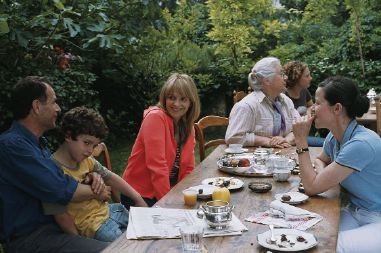Summer hours

A well-established French cinematic tradition is to spin out a story that seems to be about very little—until you get a peek beneath the surface and can see it is about a dizzying number of things. Then the themes and symbols rain down, forcing you to watch and listen carefully lest you miss one of the clues that helps explain, perhaps even solve, the tale.
So it is with Summer Hours, by writer-director Olivier Assayas (Irma Vep, Boarding Gate). The film begins at the 75th birthday party for Hélène Berthier (Edith Scob). Her family has gathered at her beautiful country home north of Paris for the celebration. Hélène’s children include Frédéric (Charles Berling, an Assayas regular), an economist who lives in France with a wise wife and two opinionated teenagers; Adrienne (a blond Juliette Binoche), a single art designer who lives in New York; and Jérémie (Jérémie Renier), a business executive who works for a running-shoe company and lives in China with his meek wife and three youngsters.
The low-key party scene takes up the entire first act, introducing us to the major players, including Éloïse (Isabelle Sadoyan), the loyal housekeeper. We also learn that the father is long dead, that the house is thick with valuable objects of art collected over the years by Hélène’s uncle, a famous French painter, and that Hélène hopes to use this rare family get-together to address what will happen to the house and its valuable contents once she dies. Frédéric is convinced that his brother and sister will want to hold onto the house so that their children can continue to enjoy it. But Hélène has her doubts, and as the second act plays out, we discover that she is right.
From a plot standpoint, the rest of the film does little more than debate and resolve the question of what will happen to the house and its possessions. Family issues are raised, most notably Hélène’s relationship with her famous uncle, but with little bitterness and few recriminations. Despite the intensity of the memories that drive their decisions, the family members are all quite civil to one another.
But it is during this exercise in civility that the film slowly morphs into a larger exploration of values, including the value of art. The desks, dressers and vases in the house are worth a lot of money, but is that more important than the emotional value they have for the family? The items could be given to a museum to honor the artist who created them, but is having them sit unused behind ropes or glass better than allowing them to be used and appreciated on a daily basis? And what is the value of memory? These pieces are part of a collection gathered by a man who was in love with the woman who now owns them, a man who may have supplanted the children’s father in her affections. How should the children of the forgotten father react?
These potentially dry questions are anything but, thanks to Assayas and cinematographer Eric Gautier. With a slew of powerful performances, a precise-moving camera and occasional bursts of profundity, the movie manages to suggest that the old house is France itself, about to give way before the economic and cultural powers swooping in from the west (the U.S.) and the east (China).
But perhaps the greatest truth in Summer Hours is contained in the film’s last line, uttered by Frédéric’s daughter during a farewell party for her friends before the house is finally sold. It is simple, direct and sad—a reminder that values change with each new generation.





